#arthur edwards renders
Explore tagged Tumblr posts
Text




self-indulgent: the Partners and the Constants renders
#hitman#hitman edit#hitman kin#hitman renders#renders#marcus stuyvesant#marcus stuyvesant renders#carl ingram#carl ingram renders#alexa carlisle#alexa carlisle renders#janus#janus renders#arthur edwards#arthur edwards kin#arthur edwards renders
3 notes
·
View notes
Text
The Ambush
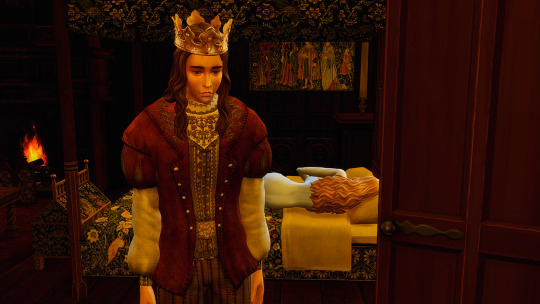
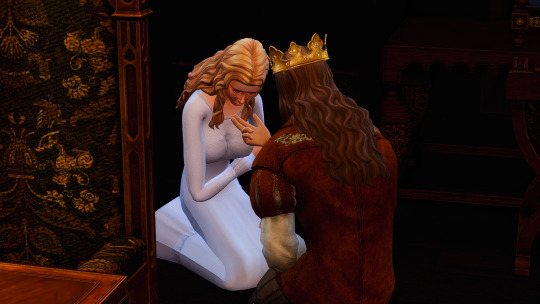
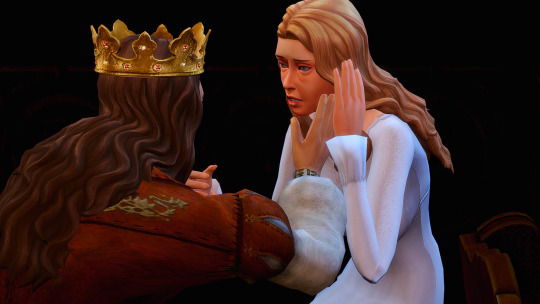

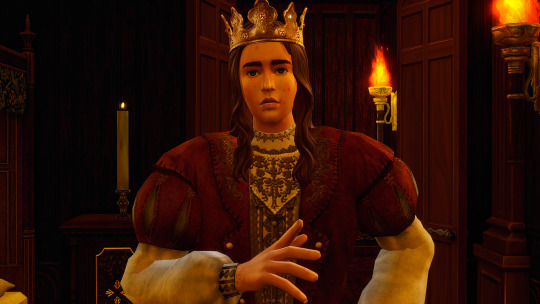
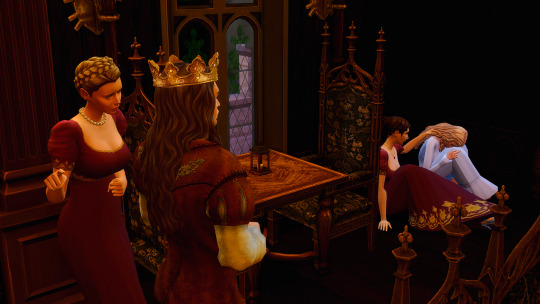
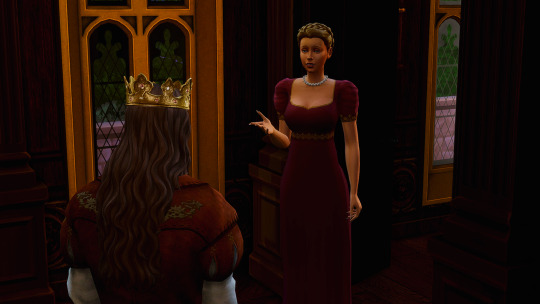


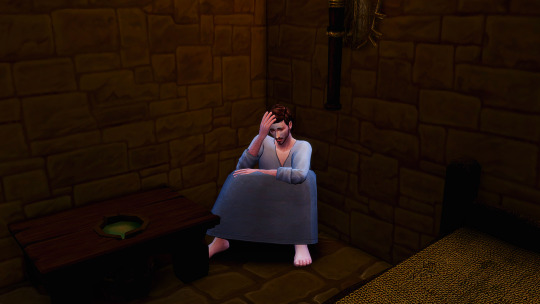
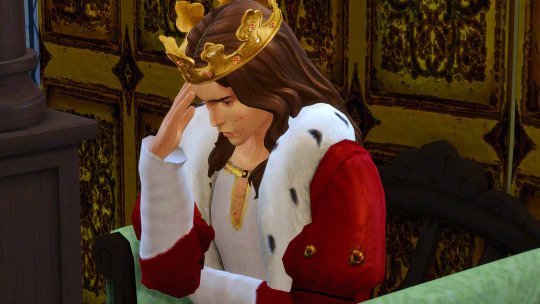
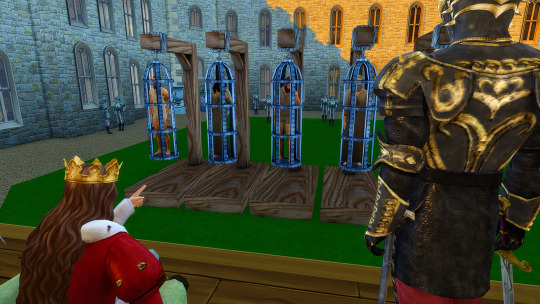
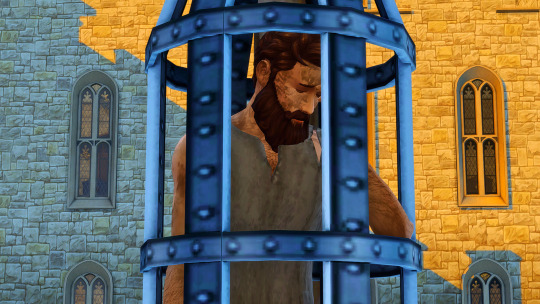
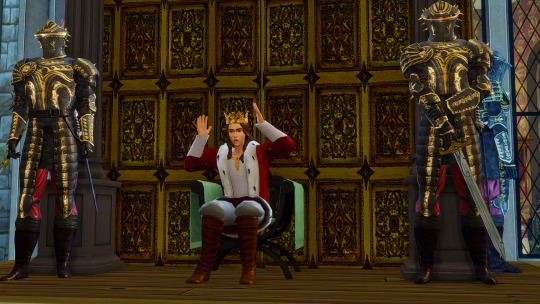
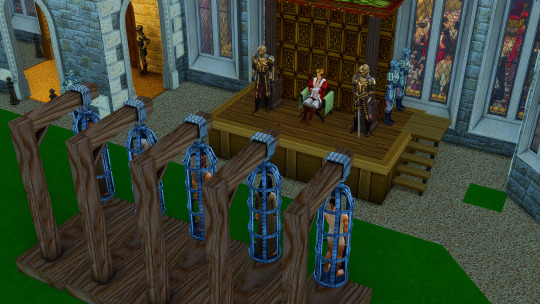

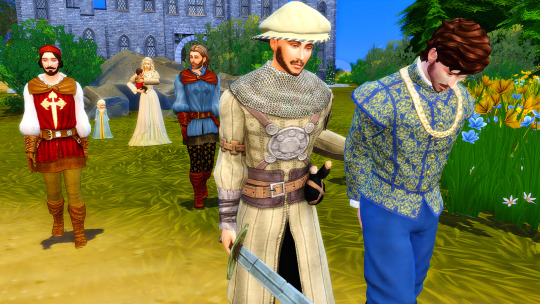
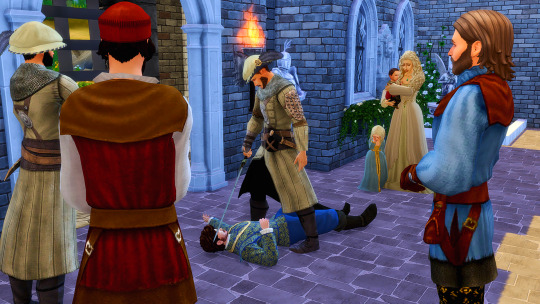
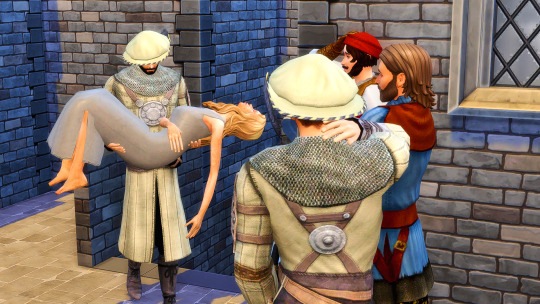
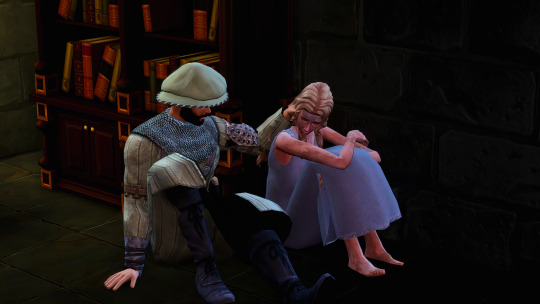
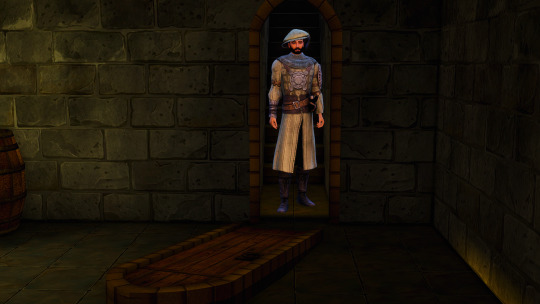
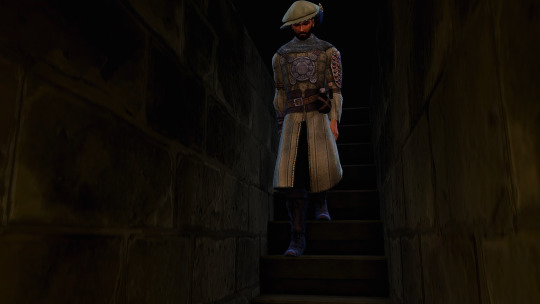
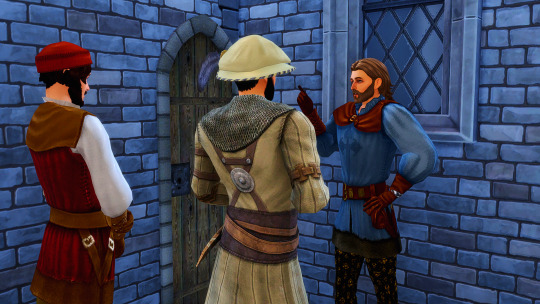
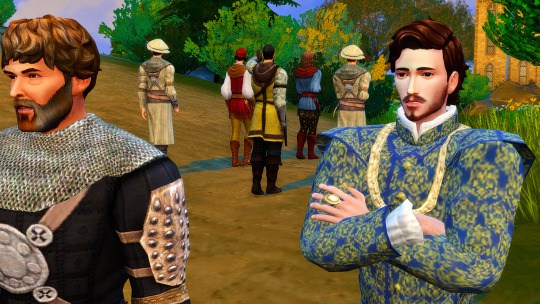

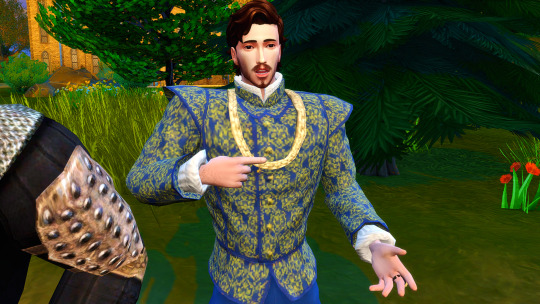
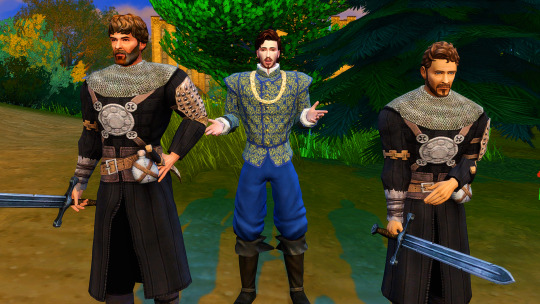
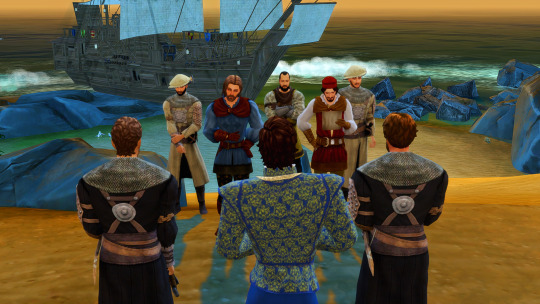
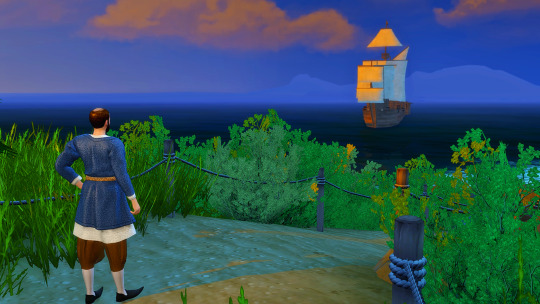

As the first rays of dawn painted the horizon, a member of the Landgraab family's staff diligently patrolled the island's coast, a routine task he performed each morning. Spotting a ship on the horizon, he hastened to inform Lord Lorus without delay. Upon the ship's arrival at the beach, Lorus stood ready with two of his guards, observing the men disembark. Recognizing them as emissaries sent directly by the King, Lorus couldn't help but feel a surge of nervous apprehension.
Accompanied by two of the King's guards, the men approached him. Sir Paul Thomas, an advisor to the King, retrieved a scroll and proceeded to read aloud from it. "By the Watchers Will, Edward, King of Windenburg, to all whom these presents shall come, greetings. Know ye that we command and direct our loyal subjects, the bearers of this writ, to enter and search the premises of Castle Landgraab for items, persons, or documents pertinent to the investigation into the disappearance of Queen Cordelia. This authority is granted to Sir Walter Arnold and his retinue, empowered to search all dwellings, buildings, and grounds within the aforesaid castle, using necessary force. Let it be known that any obstruction to this search shall be met with the full weight of our royal justice. All within Castle Landgraab must render full assistance to Sir Walter Arnold and his men. Given under our hand and seal at Windenburg Castle on the fourth day of Summer, in the year of Our Lord 1354."
Lorus directed a glare at the men, his voice seething with anger. "What is the meaning of this outrage? How dare you suspect me, the Lord of Aarbyville, of such a heinous crime? This is a grievous affront to my honor and an insult beyond measure." Sir Walter, meeting Lorus's gaze, calmly responded, "My Lord, your indignation is noted, but the gravity of the situation demands thorough scrutiny. The disappearance of the Queen Mother is a matter of utmost importance, and no person, regardless of rank, is above suspicion. We act under the King's command and seek only to uncover the truth. Cooperate, and your innocence shall be proven in due course." Lorus remained silent, his arms folded, clearly agitated as the men proceeded towards the castle.
After hours of meticulous searching, the men stumbled upon a concealed doorway tucked away within a locked room. Sir Walter wasted no time, instructing one of the King's guards to forcefully break down the door. As the heavy barrier gave way, revealing a hidden chamber, the scene that unfolded within left him stunned. There, amidst the dusty stones and dim light, sat a figure that once epitomized grace and royalty. Cordelia, once vibrant and regal, now appeared pale, frail, and dirtied by her ordeal. Her eyes widened in fear as the intruders entered, a mixture of disbelief and hope flickering in her gaze. the guard, recognizing the queen's dire state, swiftly moved to comfort her. However, the shock of their sudden appearance proved too much for Cordelia to bear. Overwhelmed, she succumbed to unconsciousness, her fragile form collapsing. The King's guard, quick to act, gently lifted her unconscious body, cradling her with utmost care.
The sight of Cordelia in such a pitiful condition struck a chord of sadness and remorse in everyone present. Here was a queen fallen from her pedestal, a poignant reminder of the harsh realities that lurked beneath the surface of royalty. As the chaos unfolded, Lorus, witnessing the scene, felt the weight of his actions crashing down upon him. In a desperate attempt to escape the impending repercussions, he made a futile dash towards the beach. But fate intervened swiftly as a vigilant King's guard intercepted him, bringing him crashing to the ground. Cecelia, Lorus's wife, stood witness to the tumultuous events unfolding before her. The shock and uncertainty mirrored in her eyes, amplified by the presence of their two children, Beatrice and Arthur. Their once-secure world unraveling before them, leaving behind a trail of shattered dreams and shattered trust.
The men led Lorus back to the awaiting ship, where he would be transported to the dungeons of Windenburg Castle pending further decisions by the King. Cecelia's gaze lingered on her departing husband, her hopes and dreams trailing after him into the distance.
Later that afternoon, within the grand courtyard of Windenburg Castle, the trial for the Jacoban Clergy unfolded. All implicated men, excluding Lord Richard, were paraded before the King enclosed in hanging iron cages, a stark spectacle that exposed their inner turmoil to the entire court. Edward's countenance transformed into a mask of fury and disappointment as he addressed the accused.
"I stand before you burdened by anger and profound disappointment," Edward's voice thundered through the courtyard, each word heavy with accusation. "You, who were entrusted with the spiritual guidance of our kingdom, have betrayed that sacred trust. The disappearance of my mother has cast a shadow over Windenburg, and your involvement in this vile act has brought shame upon us all."
The weight of Edward's words hung heavily in the air, reflected in the shame etched on the faces of the accused men, a visible testament to the gravity of their actions.
"Your actions are a crime against the crown, a sin against the Watcher, and a betrayal of the people of Windenburg," Edward's voice resounded with authority, condemning the accused before him. "No longer will your false piety shield you. Your titles, positions, and honor have been revoked. You will face justice, not by my hand but by the Proxy of the Jacoban Church in Tartosa. There, you will answer for your sins. May the Watcher have mercy on your souls, for the realm shall not."
Following the resolute verdict, Edward's expression shifted to one of disappointment and frustration, his gaze cast downward in contemplation. As Lorus was escorted to the castle, the weight of his actions bore heavily upon him. Stripped of his regal attire, he was cast into the cold, dark dungeon, where solitude became his only companion, leaving him to grapple with the consequences that not only befell him but also his family.
As the sun cast its final rays over Windenburg, Edward proceeded toward his mother's chambers, only to be halted by one of Cordelia's ladies-in-waiting. "Your Grace, please tread gently," she implored, her voice carrying a note of concern. "The Queen is in a fragile state, deeply traumatized by her ordeal. She remains disoriented and has retreated into herself, unable to recognize those around her. She needs time and delicate care to heal. Your presence may bring her comfort, but approach her with the utmost tenderness and patience. We are doing all we can to soothe her troubled mind."
With those words, the lady guided Edward into the room, where a scene of shock and disbelief unfolded before him.
"We've attempted to assist her into bed, Your Majesty, but she resists all efforts. It's as though the shadows of her captivity still haunt her, and she cannot bear the confines of the chamber," she continued with a tone of concern. "Leave us," Edward stated with a monotone gaze, acknowledging the delicate situation at hand.
Approaching Cordelia with careful steps, Edward crouched to her level, his voice filled with reassurance. "Wilhelm, please, I beg of you, do not come any closer. The darkness, the chains, they still bind me. I cannot bear to see you like this, a ghost of the past haunting me. Leave me be, I beg of you!" Cordelia cried out, her anguish palpable.
"Mother, it's me, Edward. Your son, not Wilhelm. You are safe now, away from the darkness and chains. I am here to protect you, to bring you back to the light. Please, trust me, and let me help you," the king stated softly, extending his hand to her. After a moment of hesitation, Cordelia finally allowed Edward to guide her to bed. As he walked away, a single tear glistened in his eye, bearing witness to the inner turmoil and doubt that lingered within the walls of Windenburg Castle.
#simsmedieval#royalsims#windenburg#sims4#royal#sims#gameofthrones#thesimsmedieval#royalty#simsstory#sim#sims 4 cc#historical sims#royalty sims#sim legacy#ts4 simblr#sims 4#simblr#sims 4 gameplay#sims 4 screenshots#simmer#ccfinds#simscc#royal court#british royal family#royalsim#royal family#decades legacy#ts4 legacy#sims 4 legacy
34 notes
·
View notes
Note
i am sending you a star for the heians fic. what did i miss. please gush about the heians.
did you miss anything in the heians fic? i don't think you missed anything in the heians fic. or if you did miss anything in the heians fic i don't know if it is anything that is necessarily of interest to anyone but me? y'all, i went in way too hard on this fic. the amount of research i did would infuriate and dismay you. and in all fairness i was being metaphorically swung around by the ankles and thwacked against a wall at work at the time of writing it, so i kind of had nothing else to do but get a little annoying about historical references, but. y'know. @ me maybe make it about samurai next time or like something people care about.
oh, here's a thing i guess—i kind of liked my rendering of the one historical poem presented in full in this fic, Michitsuna no Haha's poem of the barred gate. in Edward Seidensticker's translation:
Do you know how slow the dawn can be when you have to wait alone?
and in Sonja Arntzen's (superior) rendition:
Sorrow, sorrowing when one sleeps alone the time until night opens into day, how long it is perhaps you now know it too.
like DAMN Sonja. that hits DIFFERENT. but at the same time having decided to not commit to the 5-7-5-7-7 meter throughout because i'm too fucking lazy i wanted to keep the flow of the poetic exchanges less formalized and more conversational as they would have felt in real heians time, i wanted to compress the feeling Arntzen captured into something a little pithier like Seidensticker's version. (but less stupidly phrased. "how slow the dawn can be"? like my mans, surely "how slow the coming of the dawn" makes more fucking sense.) hence:
How long and chill the night when one must sleep alone—perhaps you understand it now!
and yes, i lost the "opening" imagery that plays on the barred gate, and yes, maybe i added in some meteorological allusions that weren't in the original, and no, i still don't speak any japanese and am just going on vibes, SORRY I KNOW THAT MAKES ME JUST LIKE ARTHUR WALEY WHICH IS DISGUSTING OF ME, but idk. all things considered, at the very least i think mine reads a leetle nicer than Ed's.
and additionally, here's a secret: i kinda fucked up my shinden-zukuri architecture in the first section frankly. there's no real reason why the lady of the house would be hanging out in the hisashi alone in the middle of the night while her ladies-in-waiting are asleep in the moya. i guess you could handwave it like "ohh she stayed up waiting for Kaneie ohhh she couldn't stay in the inner room with all those people ohh Desire was simply doing some fuckshit" but like. get real. be serious. why would she have a brazier out there? why would she call it "my rooms"? (i guess there's an argument to be made that by "my rooms" she's referring to her entire wing of the house but still.) she's practically NAKED hanging out out there fully dressed in multiple layers with the screen slightly cracked. UNACCEPTABLY whorish behavior.
fucking intolerable. i'm humiliated. this is worse than the poems not scanning in a language i have never studied and do not speak. Sonja Arntzen is en route to my house to visit unspeakable horrors upon my person at this very moment. and it's like noooo, Sonja, please, i'm not even a heians scholar, spare me and i'll help you hunt down Royall Tyler instead!! but she doesn't care. she just. doesn't. care.
#ask games#chatter#from what i understand it's pretty normal for all the academics in a given field to want to kill each other with weapons#(this user <- is not an academic)#but the difficult thing in english-language heian scholarship is there's like eight people in there tops#so i guess it's sort of the thing to do to just violently call out your academic colleagues in your published works#because like. come on. you're talking about a monograph about spirit possession as a device for female empowerment#OBVIOUSLY that's doris bargen. you look dumber if you try to gloss that. everyone knows you're talking about doris#which leads to some very funny moments in published works where the acknowledgements are like ''i'd like to thank paul schalow''#and then the body of the work is like ''PAUL SCHALOW IF I EVER SEE YOUR MEDIOCRE SCHOLARSHIP AGAIN YOU WILL KNOW FEAR BEFORE THE END''#anyway the tyler gengy is my favorite translation. and yes given the chance i would still kick royall tyler in the nuts#because i don't think he thinks women have brains#and that is the true spirit of heian scholarship babey!
2 notes
·
View notes
Text
The Last Kingdom x BBC Merlin
I am not trying to say that there is overlapping in any form or meaning between the two stories. I just like to play with my fantasy and I see A&M in everything nowadays, sooooo here I am.
When watching this scene in The Last Kingdom S3 E9, the images of Arthur and Merlin popped into my head. As if they were the ones having this conversation, not in canon, of course. Merlin as Uthred, Arthur as Alfred.
Merlin was exiled when Arthur discovered his magic. Now, Arthur is sick and dying, and though he is still angry about Merlin's betrayal, he wants to make peace with him. And they are discussing the future of Camelot and Merlin's role in it.
Alfred: Why are you here?
Uthred: In Winchester?
A: In this room.
U: I was told you wished to speak.
A: Why grant me that wish? What is it you want from me? What is it you would say to me, while I am still able to listen?
U: If I were to say one thing, it would be that I could never have killed you. [...] I could never have taken your life. I would have beaten you, gladly. But I would never be the man who killed Alfred, King of Saxons.
A: Killing me would have earned you a place in these (chronicle) pages.
U: I would not want such a deed written. Besides, I have earned my place in these pages. But every lord is the hero of his own songs. I understand my absence.
A: It will not be written that Alfred did stand on Uthred’s shoulders. Many times. But I know it to be true.
U: Thank you, Lord.
A (lifts his sword and points its end at Uthred's throat): Do you believe I could end your life? You are an outlaw. It will be written that Alfred, frail and sick, did find the strength to slay the warrior Uthred Ragnarson.
U: It will not happen.
A: Because I lack the will?
U: Because we are bonded. You cannot kill me, just as I cannot kill you.
A: My sword is heavy. I must sit. There is wine in the jug, if you would.
I like to think that this would never have been the outcome of the Merlin series if Arthur had survived the battle of Camlann. But still, this scene just somehow caught my attention. :)
...
A: [...] I was wrong in both my judgment and my punishment (Uthred’s banishment). I did not give you the respect nor trust that you deserved. I was afraid. I am afraid. Not of you, not of death… but of losing everything that Wessex has become, everything that is written here in these pages. My work must continue. This land must grow. An England must emerge […]. We are and we remain the last true Saxon kingdom. We cannot go on building walls between the tribes. Similarly, we cannot be overrun. That would render my time as worthless. My father’s time, […], it would have all have been wasted. […] My last act, […], must be to ensure that good man hold power. That is what I must do. And that is why you are here, in this room.
Up until to this point, I can see it as Arthur talking to Merlin. But what comes next is what Uther would say to Merlin in the actual legend. Uther as Alfred, Merlin as Uthred.
Assuming that Uther banished Merlin and now he wants to make peace with him to help Arthur become the king that was prophesied. Oh it's quite a twist, I know, but my imagination is funny sometimes. :)
A: It seems just yesterday, that I gave Edward over to you as a dying infant. Uthred, I wish to give my son over to you for a second time and for the same reason as the first. To ensure he lives. Say nothing, not yet. All I ask is that you remain in Winchester until he is crowned king. Than you can do as you please. You can go north (Merlin is originally from the Cumbric region, somewhere around the late kingdom of Strathclyde -today’s Glasgow- and the Brigantes region -Rheged or Gododdin. The exact location doesn't matter now anyways.). You can reclaim your lands.
U: I am an outlaw, Lord.
A: No longer. You are hereby pardoned.
U: On condition I remain in Winchester.
A: You are pardoned regardless of your decision. I have made my peace. I have made my request. I do not require an answer.
U: Thank you, Lord, for correcting your mistake.
...
And in this last piece it's also like if Arthur was toasting Merlin.
A (he raises his cup of wine): To Uthred, the true Lord of Bebbanburg, a man I have never understood, but without whom I would not die a king.
✨ These scenes would also be great plots or prompts for fan fiction. ✨
4 notes
·
View notes
Text
Unveiling the Mysteries: "The Book of Ceremonial Magic" by Arthur Edward Waite

Arthur Edward Waite's "The Book of Ceremonial Magic" is a magnum opus that unveils the hidden world of ceremonial magic, offering readers an in-depth exploration of its rituals, symbols, and the esoteric traditions that have shaped it. In this one-page book review, we will delve into the key facets of this monumental work.
Waite, a distinguished scholar of the occult, takes readers on an enlightening journey through the intricate tapestry of ceremonial magic. The book is masterfully organized, commencing with an historical overview of the subject, tracing its roots, and highlighting its evolution through the ages. Waite's writing style, though erudite, remains accessible to both neophytes and adepts in the realm of the occult.
One of the book's most noteworthy attributes is its meticulous attention to detail. Waite provides an exhaustive examination of the rituals, tools, and symbols intrinsic to ceremonial magic. This thoroughness renders the book an indispensable resource for those aspiring to a profound comprehension of this mystical practice. His explanations are lucid and grounded in meticulous research, ensuring that readers can navigate the intricacies of the subject matter.
"The Book of Ceremonial Magic" delves deep into the philosophical foundations of magic, elucidating its interplay with spirituality, religion, and the human psyche. Waite's insights into the psychological aspects of magic are especially compelling, shedding light on its transformative potency within the practitioner's inner world.
One of the book's notable strengths is its inclusivity. Waite provides a comprehensive overview of various schools of thought within ceremonial magic, affording readers a holistic perspective. He draws upon a rich tapestry of historical and cultural sources, underscoring the global relevance of this esoteric tradition.
Nevertheless, Waite's writing style can pose a challenge to some readers. His prose, while rich and insightful, can be dense and scholarly, necessitating careful reading to fully grasp the content. Yet, for those willing to invest their time and intellectual effort, the book offers unparalleled rewards, a treasure trove of knowledge and contemplation.
In summary, "The Book of Ceremonial Magic" by Arthur Edward Waite stands as an indispensable tome for anyone intrigued by occultism, mysticism, and ceremonial magic. It serves as both a comprehensive guide and a wellspring of inspiration for individuals seeking to plumb the depths of human spirituality and unravel the mysteries of the universe. Waite's expertise and unwavering dedication to his subject shine brightly, ensuring that this book remains a timeless classic in the annals of esoteric literature.
Arthur Edward Waite's "The Book of Ceremonial Magic" is available in Amazon in paperback 21.99$ and hardcover 28.99$ editions.
Number of pages: 479
Language: English
Rating: 9/10
Link of the book!
Review By: King's Cat
#arthuredwardwaite#occult#occultism#occultbook#magic#ceremonialmagic#blackmagic#mystic#kaballah#goetia#secret traditions#rites#goetic mysteries#sorcery#necromancy#theurgy
0 notes
Text
Unveiling the Mysteries: "The Book of Ceremonial Magic" by Arthur Edward Waite

Arthur Edward Waite's "The Book of Ceremonial Magic" is a magnum opus that unveils the hidden world of ceremonial magic, offering readers an in-depth exploration of its rituals, symbols, and the esoteric traditions that have shaped it. In this one-page book review, we will delve into the key facets of this monumental work.
Waite, a distinguished scholar of the occult, takes readers on an enlightening journey through the intricate tapestry of ceremonial magic. The book is masterfully organized, commencing with an historical overview of the subject, tracing its roots, and highlighting its evolution through the ages. Waite's writing style, though erudite, remains accessible to both neophytes and adepts in the realm of the occult.
One of the book's most noteworthy attributes is its meticulous attention to detail. Waite provides an exhaustive examination of the rituals, tools, and symbols intrinsic to ceremonial magic. This thoroughness renders the book an indispensable resource for those aspiring to a profound comprehension of this mystical practice. His explanations are lucid and grounded in meticulous research, ensuring that readers can navigate the intricacies of the subject matter.
"The Book of Ceremonial Magic" delves deep into the philosophical foundations of magic, elucidating its interplay with spirituality, religion, and the human psyche. Waite's insights into the psychological aspects of magic are especially compelling, shedding light on its transformative potency within the practitioner's inner world.
One of the book's notable strengths is its inclusivity. Waite provides a comprehensive overview of various schools of thought within ceremonial magic, affording readers a holistic perspective. He draws upon a rich tapestry of historical and cultural sources, underscoring the global relevance of this esoteric tradition.
Nevertheless, Waite's writing style can pose a challenge to some readers. His prose, while rich and insightful, can be dense and scholarly, necessitating careful reading to fully grasp the content. Yet, for those willing to invest their time and intellectual effort, the book offers unparalleled rewards, a treasure trove of knowledge and contemplation.
In summary, "The Book of Ceremonial Magic" by Arthur Edward Waite stands as an indispensable tome for anyone intrigued by occultism, mysticism, and ceremonial magic. It serves as both a comprehensive guide and a wellspring of inspiration for individuals seeking to plumb the depths of human spirituality and unravel the mysteries of the universe. Waite's expertise and unwavering dedication to his subject shine brightly, ensuring that this book remains a timeless classic in the annals of esoteric literature.
Arthur Edward Waite's "The Book of Ceremonial Magic" is available in Amazon in paperback 21.99$ and hardcover 28.99$ editions.
Number of pages: 479
Language: English
Rating: 9/10
Link of the book!
Review By: King's Cat
#arthuredwardwaite#occult#occultism#occultbook#magic#ceremonialmagic#blackmagic#mystic#kaballah#goetia#secret traditions#rites#goetic mysteries#sorcery#necromancy#theurgy
1 note
·
View note
Photo

Happy Fourth of July!
The Engrossed Declaration of Independence:
Series: Miscellaneous Papers of the Continental Congress, 1774 - 1789
Record Group 360: Records of the Continental and Confederation Congresses and the Constitutional Convention, 1765 - 1821
Transcription:
IN CONGRESS, JULY 4, 1776.
The unanimous Declaration of the thirteen united States of America,
When, in the course of human events, it becomes necessary for one people to dissolve the political bonds which have connected them with another, and to assume among the powers of the earth, the separate and equal station to which the laws of Nature and of Nature's God entitle them, a decent respect to the opinions of mankind requires that they should declare the causes which impel them to the separation.____________ We hold these truths to be self-evident, that all men are created equal, that they are endowed by their Creator with certain unalienable Rights, that among these are Life, Liberty and the pursuit of Happiness. That to secure these rights, governments are instituted among Men, deriving their just powers from the consent of the governed.__ That whenever any form of government becomes destructive of these ends, it is the Right of the People to alter or to abolish it, and to institute new government, laying its foundation on such principles and organizing its powers in such form, as to them shall seem most likely to affect their Safety and Happiness. Prudence, indeed, will dictate that governments long established should not be changed for light and transient causes; and accordingly, all experience hath shown that mankind is more disposed to suffer, while evils are sufferable than to right themselves by abolishing the forms to which they are accustomed. But when a long train of abuses and usurpations, pursuing invariably the same Object evinces a design to reduce them under absolute Despotism, it is their right, it is their duty, to throw off such Government, and to provide new guards for their future security. __Such has been the patient sufferance of these Colonies, and such is now the necessity which constrains them to alter their former systems of government. The history of the present King of Great Britain is a history of repeated injuries and usurpations, all having in direct object the establishment of an absolute Tyranny over these States. To prove this, let Facts be submitted to a candid world. _________ He has refused his Assent to Laws, the most wholesome and necessary for the public good._______ He has forbidden his governors to pass laws of immediate and pressing importance unless suspended in their operation till his assent should be obtained; and when so suspended, he has utterly neglected to attend to them.________ He has refused to pass other Laws for the accommodation of large districts of people unless those people would relinquish the right of Representation in the Legislature, a right inestimable to them and formidable to tyrants only._______ He has called together legislative bodies at places unusual, uncomfortable, and distant from the depository of their Public Records, for the sole purpose of fatiguing them into compliance with his measures. _______He has dissolved Representative Houses repeatedly, for opposing with manly firmness his invasions on the rights of the people.______ He has refused for a long time, after such dissolutions, to cause others to be elected; whereby the Legislative powers, incapable of Annihilation, have returned to the People at large for their exercise; the State remaining in the meantime exposed to all the dangers of invasion from without, and convulsions within. _____He has endeavored to prevent the Population of these States; for that purpose obstructing the Laws for naturalization of Foreigners; refusing to pass others to encourage their migration hither, and raising the conditions of new Appropriations of Lands. ______He has obstructed the Administration of Justice, by refusing his Assent to Laws for establishing Judiciary Powers.________ He has made judges dependent on his Will alone, for the tenure of their offices, and the Amount and Payment of their salaries. ________ He has erected a multitude of New Offices, and sent hither swarms of Officers to harass our People, and eat out their substance. ____He has kept among us, in times of peace, Standing Armies without the consent of our legislature._____ He has affected to render the Military independent of and superior to the Civil Power. _______He has combined with others to subject us to a jurisdiction foreign to our constitution, and unacknowledged by our laws; giving his Assent to their Acts of pretended Legislation:__For quartering large bodies of armed troops among us:__For protecting them, by mock Trial, from Punishment for any Murders which they should commit on the Inhabitants of these States:__For cutting off our Trade with all parts of the world:__For imposing Taxes on us without our Consent:__For depriving us in many cases, of the benefits of Trial by Jury:__ For transporting us beyond Seas to be tried for pretended offenses:___ For abolishing the free System of English Laws in a neighboring Province, establishing therein an Arbitrary government, and enlarging its Boundaries so as to render it at once an example and fit instrument for introducing the same absolute rule in these Colonies:___ For taking away our Charters, abolishing our most valuable Laws, and altering fundamentally the forms of our Governments:____For suspending our own Legislatures, and declaring themselves invested with Power to legislate for us in all cases whatsoever.__ He has abdicated Government here, by declaring us out of his Protection and waging War against us._____He has plundered our seas, ravaged our Coasts, burned our towns, and destroyed the Lives of our People.____He is at this time transporting large Armies of foreign Mercenaries to complete the works of death, desolation, and tyranny, already begun with circumstances of Cruelty and Perfidy scarcely paralleled in the most barbarous ages, and totally unworthy the Head of a civilized nation.____He has constrained our fellow Citizens taken Captive on the high seas to bear Arms against their Country, to become the executioners of their friends and Brethren, or to fall themselves by their Hands.____He has excited domestic insurrections amongst us and has endeavored to bring on the inhabitants of our frontiers, the merciless Indian Savages, whose known rule of warfare, is an undistinguished destruction of all ages, sexes, and conditions. In every stage of these Oppressions, We have Petitioned for Redress in the most humble terms: Our repeated Petitions have been answered only by repeated injury. A Prince, whose character is thus marked by every act which may define a Tyrant, is unfit to be the ruler of a free People. Nor have We been wanting in attentions to our British brethren. We have warned them from time to time of attempts by their legislature to extend an unwarrantable jurisdiction over us. We have reminded them of the circumstances of our emigration and settlement here. We have appealed to their native justice and magnanimity, and we have conjured them by the ties of our common kindred to disavow these usurpations, which, would inevitably interrupt our connections and correspondence. They too have been deaf to the voice of justice and of consanguinity. We must, therefore, acquiesce in the necessity, which denounces our Separation, and hold them, as we hold the rest of mankind, Enemies in War, in Peace Friends._____
We, therefore, the Representatives of the United States of America, in General Congress, Assembled, appealing to the Supreme Judge of the world for the rectitude of our intentions, do, in the Name, and by the Authority of the good People of these Colonies, solemnly Publish and declare, that these United Colonies are, and of Right ought to be Free and Independent Sates; that they are Absolved from all Allegiance to the British Crown, and that all political connection between them and the State of Great Britain, is and ought to be totally dissolved; and that as Free and Independent States, they have full power to levy War, conclude Peace, contract Alliances, establish Commerce, and to do all other Acts and Things which the Independent States may of right do. ___ And for the support of this Declaration, with a firm reliance on the protection of Divine Providence, we mutually pledge to each other our Lives, our Fortunes and our sacred Honor.
Button Gwinnett Wm Hooper John Hancock Rob Morris Wm Floyd Josiah Bartlett
Lyman Hall Joseph Hewes Samuel Chase Benjamin Rush Philip Livingston Wm Whipple
Geo Walton John Penn Wm Paca Benj Franklin Fran Lewis Sam Adams
Tho Stone John Morton Lewis Morris John Adams
Edward Rutledge Charles Carrol of Carrollton Geo Clymer Rob Treat Paine
Ja. Smith Elbridge Gerry
Geo Taylor Step. Hopkins
Tho Heyward Jnr James Wilson Rich Stockton William Ellery
Thomas Lynch Jnr George Wythe Gro. Ross Jn Witherspoon Roger Sherman
Richard Henry Lee
Arthur Middleton Th Jefferson Ceasar Rodney Fra. Hopkinson Sam Huntington
Benj Harrison Geo Read John Hart Wm Williams
Th Nelson jr. Tho M Kean Abra Clark Oliver Wolcott
Francis Lightfoot Lee Matthew Thornton
Carter Braxton
474 notes
·
View notes
Note
On that note (and I realize you've probably already talked about this) if Henry did have a younger brother(s) meaning Edmund survived or Elizabeth of York and Henry VII had more sons do you think he would have divorced Catherine or do you think he still would have wanted a son that was his to inherit the throne?
It was always going to be very politically complicated, and probably unpopular, to annull his marriage with Catherine, particularly so many years after cohabiting and living as husband and wife (this rendered 'honesty' and was part of the reasoning of the sentence supporting it by Clement in 1533:
Even if the prohibition was de jure divino, the dispensation was good. "the King has acted on it for many years, and deprived himself of the right of protestation against it."
and in 1534, in the final sentence...one wonders, in light of this, if the marriage of Arthur and Catherine had lasted a year or so longer, if there would have been a dispensation for the next at all)
The argument for Henry still taking the same path in the circumstances of having younger brothers would be that technically Henry did have male relatives that he could have vested as heirs to the throne in 1527. There was James V, Henry Brandon, and the one that would nearly die for his closeness to the royal bloodline in the future, Edward Courtenay.
But, I don't find that to be a particularly strong argument. 1) The likelihood of the House of Lords and Commons consenting to foreign rule in the future, scant (there's also the issue of overextension of rule-- the Revolt of the Comuneros occurred in the case of Charles V because he was hardly ever in Castile), nephew of the king is not a strong, direct line 2) Ditto, Charles Brandon's dispensation to wed a princess in the first place was...questionable (part of me wonders if this is why Henry bypassed Frances Grey née Brandon in the Succession Act) 3) Great-grandson of Edward IV is, again, strong enough for a figurehead of a failed coup, but not much stronger than that.
All of the above, simply, were not the children of a queen and king. If Henry's brothers had survived, they indisputably would have been in the line of succession, just as Henry himself was. He would have probably eventually remarried with the hope of sons in the event of his wife's death, but I don't think it would have felt so urgent...because it wouldn't have been. And in the event that he did still have the same conscience-call, scriptural study, religious doubt, and proceeded in the same way, if it was stonewalled he likely would've given up after Blackfriars. Because again, failure would be embarassing, but not so urgent to be remedied.
4 notes
·
View notes
Text
Declaration of Independence: A Transcription
Note: The following text is a transcription of the Stone Engraving of the parchment Declaration of Independence (the document on display in the Rotunda at the National Archives Museum.)
The spelling and punctuation reflects the original.
In Congress, July 4, 1776
The unanimous Declaration of the thirteen united States of America,
When in the Course of human events, it becomes necessary for one people to dissolve the political bands which have connected them with another, and to assume among the powers of the earth, the separate and equal station to which the Laws of Nature and of Nature's God entitle them, a decent respect to the opinions of mankind requires that they should declare the causes which impel them to the separation.
We hold these truths to be self-evident, that all men are created equal, that they are endowed by their Creator with certain unalienable Rights, that among these are Life, Liberty and the pursuit of Happiness.--That to secure these rights, Governments are instituted among Men, deriving their just powers from the consent of the governed, --That whenever any Form of Government becomes destructive of these ends, it is the Right of the People to alter or to abolish it, and to institute new Government, laying its foundation on such principles and organizing its powers in such form, as to them shall seem most likely to effect their Safety and Happiness. Prudence, indeed, will dictate that Governments long established should not be changed for light and transient causes; and accordingly all experience hath shewn, that mankind are more disposed to suffer, while evils are sufferable, than to right themselves by abolishing the forms to which they are accustomed. But when a long train of abuses and usurpations, pursuing invariably the same Object evinces a design to reduce them under absolute Despotism, it is their right, it is their duty, to throw off such Government, and to provide new Guards for their future security.--Such has been the patient sufferance of these Colonies; and such is now the necessity which constrains them to alter their former Systems of Government. The history of the present King of Great Britain is a history of repeated injuries and usurpations, all having in direct object the establishment of an absolute Tyranny over these States. To prove this, let Facts be submitted to a candid world.
He has refused his Assent to Laws, the most wholesome and necessary for the public good.
He has forbidden his Governors to pass Laws of immediate and pressing importance, unless suspended in their operation till his Assent should be obtained; and when so suspended, he has utterly neglected to attend to them.
He has refused to pass other Laws for the accommodation of large districts of people, unless those people would relinquish the right of Representation in the Legislature, a right inestimable to them and formidable to tyrants only.
He has called together legislative bodies at places unusual, uncomfortable, and distant from the depository of their public Records, for the sole purpose of fatiguing them into compliance with his measures.
He has dissolved Representative Houses repeatedly, for opposing with manly firmness his invasions on the rights of the people.
He has refused for a long time, after such dissolutions, to cause others to be elected; whereby the Legislative powers, incapable of Annihilation, have returned to the People at large for their exercise; the State remaining in the mean time exposed to all the dangers of invasion from without, and convulsions within.
He has endeavoured to prevent the population of these States; for that purpose obstructing the Laws for Naturalization of Foreigners; refusing to pass others to encourage their migrations hither, and raising the conditions of new Appropriations of Lands.
He has obstructed the Administration of Justice, by refusing his Assent to Laws for establishing Judiciary powers.
He has made Judges dependent on his Will alone, for the tenure of their offices, and the amount and payment of their salaries.
He has erected a multitude of New Offices, and sent hither swarms of Officers to harrass our people, and eat out their substance.
He has kept among us, in times of peace, Standing Armies without the Consent of our legislatures.
He has affected to render the Military independent of and superior to the Civil power.
He has combined with others to subject us to a jurisdiction foreign to our constitution, and unacknowledged by our laws; giving his Assent to their Acts of pretended Legislation:
For Quartering large bodies of armed troops among us:
For protecting them, by a mock Trial, from punishment for any Murders which they should commit on the Inhabitants of these States:
For cutting off our Trade with all parts of the world:
For imposing Taxes on us without our Consent:
For depriving us in many cases, of the benefits of Trial by Jury:
For transporting us beyond Seas to be tried for pretended offences
For abolishing the free System of English Laws in a neighbouring Province, establishing therein an Arbitrary government, and enlarging its Boundaries so as to render it at once an example and fit instrument for introducing the same absolute rule into these Colonies:
For taking away our Charters, abolishing our most valuable Laws, and altering fundamentally the Forms of our Governments:
For suspending our own Legislatures, and declaring themselves invested with power to legislate for us in all cases whatsoever.
He has abdicated Government here, by declaring us out of his Protection and waging War against us.
He has plundered our seas, ravaged our Coasts, burnt our towns, and destroyed the lives of our people.
He is at this time transporting large Armies of foreign Mercenaries to compleat the works of death, desolation and tyranny, already begun with circumstances of Cruelty & perfidy scarcely paralleled in the most barbarous ages, and totally unworthy the Head of a civilized nation.
He has constrained our fellow Citizens taken Captive on the high Seas to bear Arms against their Country, to become the executioners of their friends and Brethren, or to fall themselves by their Hands.
He has excited domestic insurrections amongst us, and has endeavoured to bring on the inhabitants of our frontiers, the merciless Indian Savages, whose known rule of warfare, is an undistinguished destruction of all ages, sexes and conditions.
In every stage of these Oppressions We have Petitioned for Redress in the most humble terms: Our repeated Petitions have been answered only by repeated injury. A Prince whose character is thus marked by every act which may define a Tyrant, is unfit to be the ruler of a free people.
Nor have We been wanting in attentions to our Brittish brethren. We have warned them from time to time of attempts by their legislature to extend an unwarrantable jurisdiction over us. We have reminded them of the circumstances of our emigration and settlement here. We have appealed to their native justice and magnanimity, and we have conjured them by the ties of our common kindred to disavow these usurpations, which, would inevitably interrupt our connections and correspondence. They too have been deaf to the voice of justice and of consanguinity. We must, therefore, acquiesce in the necessity, which denounces our Separation, and hold them, as we hold the rest of mankind, Enemies in War, in Peace Friends.
We, therefore, the Representatives of the united States of America, in General Congress, Assembled, appealing to the Supreme Judge of the world for the rectitude of our intentions, do, in the Name, and by Authority of the good People of these Colonies, solemnly publish and declare, That these United Colonies are, and of Right ought to be Free and Independent States; that they are Absolved from all Allegiance to the British Crown, and that all political connection between them and the State of Great Britain, is and ought to be totally dissolved; and that as Free and Independent States, they have full Power to levy War, conclude Peace, contract Alliances, establish Commerce, and to do all other Acts and Things which Independent States may of right do. And for the support of this Declaration, with a firm reliance on the protection of divine Providence, we mutually pledge to each other our Lives, our Fortunes and our sacred Honor.
Georgia
Button Gwinnett
Lyman Hall
George Walton
North Carolina
William Hooper
Joseph Hewes
John Penn
South Carolina
Edward Rutledge
Thomas Heyward, Jr.
Thomas Lynch, Jr.
Arthur Middleton
Massachusetts
John Hancock
Maryland
Samuel Chase
William Paca
Thomas Stone
Charles Carroll of Carrollton
Virginia
George Wythe
Richard Henry Lee
Thomas Jefferson
Benjamin Harrison
Thomas Nelson, Jr.
Francis Lightfoot Lee
Carter Braxton
Pennsylvania
Robert Morris
Benjamin Rush
Benjamin Franklin
John Morton
George Clymer
James Smith
George Taylor
James Wilson
George Ross
Delaware
Caesar Rodney
George Read
Thomas McKean
New York
William Floyd
Philip Livingston
Francis Lewis
Lewis Morris
New Jersey
Richard Stockton
John Witherspoon
Francis Hopkinson
John Hart
Abraham Clark
New Hampshire
Josiah Bartlett
William Whipple
Massachusetts
Samuel Adams
John Adams
Robert Treat Paine
Elbridge Gerry
Rhode Island
Stephen Hopkins
William Ellery
Connecticut
Roger Sherman
Samuel Huntington
William Williams
Oliver Wolcott
New Hampshire
Matthew Thornton
10 notes
·
View notes
Note
In Congress, July 4, 1776
The unanimous Declaration of the thirteen united States of America, When in the Course of human events, it becomes necessary for one people to dissolve the political bands which have connected them with another, and to assume among the powers of the earth, the separate and equal station to which the Laws of Nature and of Nature's God entitle them, a decent respect to the opinions of mankind requires that they should declare the causes which impel them to the separation.
We hold these truths to be self-evident, that all men are created equal, that they are endowed by their Creator with certain unalienable Rights, that among these are Life, Liberty and the pursuit of Happiness.--That to secure these rights, Governments are instituted among Men, deriving their just powers from the consent of the governed, --That whenever any Form of Government becomes destructive of these ends, it is the Right of the People to alter or to abolish it, and to institute new Government, laying its foundation on such principles and organizing its powers in such form, as to them shall seem most likely to effect their Safety and Happiness. Prudence, indeed, will dictate that Governments long established should not be changed for light and transient causes; and accordingly all experience hath shewn, that mankind are more disposed to suffer, while evils are sufferable, than to right themselves by abolishing the forms to which they are accustomed. But when a long train of abuses and usurpations, pursuing invariably the same Object evinces a design to reduce them under absolute Despotism, it is their right, it is their duty, to throw off such Government, and to provide new Guards for their future security.--Such has been the patient sufferance of these Colonies; and such is now the necessity which constrains them to alter their former Systems of Government. The history of the present King of Great Britain is a history of repeated injuries and usurpations, all having in direct object the establishment of an absolute Tyranny over these States. To prove this, let Facts be submitted to a candid world.
He has refused his Assent to Laws, the most wholesome and necessary for the public good.
He has forbidden his Governors to pass Laws of immediate and pressing importance, unless suspended in their operation till his Assent should be obtained; and when so suspended, he has utterly neglected to attend to them.
He has refused to pass other Laws for the accommodation of large districts of people, unless those people would relinquish the right of Representation in the Legislature, a right inestimable to them and formidable to tyrants only.
He has called together legislative bodies at places unusual, uncomfortable, and distant from the depository of their public Records, for the sole purpose of fatiguing them into compliance with his measures.
He has dissolved Representative Houses repeatedly, for opposing with manly firmness his invasions on the rights of the people.
He has refused for a long time, after such dissolutions, to cause others to be elected; whereby the Legislative powers, incapable of Annihilation, have returned to the People at large for their exercise; the State remaining in the mean time exposed to all the dangers of invasion from without, and convulsions within.
He has endeavoured to prevent the population of these States; for that purpose obstructing the Laws for Naturalization of Foreigners; refusing to pass others to encourage their migrations hither, and raising the conditions of new Appropriations of Lands.
He has obstructed the Administration of Justice, by refusing his Assent to Laws for establishing Judiciary powers.
He has made Judges dependent on his Will alone, for the tenure of their offices, and the amount and payment of their salaries.
He has erected a multitude of New Offices, and sent hither swarms of Officers to harrass our people, and eat out their substance.
He has kept among us, in times of peace, Standing Armies without the Consent of our legislatures.
He has affected to render the Military independent of and superior to the Civil power.
He has combined with others to subject us to a jurisdiction foreign to our constitution, and unacknowledged by our laws; giving his Assent to their Acts of pretended Legislation:
For Quartering large bodies of armed troops among us:
For protecting them, by a mock Trial, from punishment for any Murders which they should commit on the Inhabitants of these States:
For cutting off our Trade with all parts of the world:
For imposing Taxes on us without our Consent:
For depriving us in many cases, of the benefits of Trial by Jury:
For transporting us beyond Seas to be tried for pretended offences
For abolishing the free System of English Laws in a neighbouring Province, establishing therein an Arbitrary government, and enlarging its Boundaries so as to render it at once an example and fit instrument for introducing the same absolute rule into these Colonies:
For taking away our Charters, abolishing our most valuable Laws, and altering fundamentally the Forms of our Governments:
For suspending our own Legislatures, and declaring themselves invested with power to legislate for us in all cases whatsoever.
He has abdicated Government here, by declaring us out of his Protection and waging War against us.
He has plundered our seas, ravaged our Coasts, burnt our towns, and destroyed the lives of our people.
He is at this time transporting large Armies of foreign Mercenaries to compleat the works of death, desolation and tyranny, already begun with circumstances of Cruelty & perfidy scarcely paralleled in the most barbarous ages, and totally unworthy the Head of a civilized nation.
He has constrained our fellow Citizens taken Captive on the high Seas to bear Arms against their Country, to become the executioners of their friends and Brethren, or to fall themselves by their Hands.
He has excited domestic insurrections amongst us, and has endeavoured to bring on the inhabitants of our frontiers, the merciless Indian Savages, whose known rule of warfare, is an undistinguished destruction of all ages, sexes and conditions.
In every stage of these Oppressions We have Petitioned for Redress in the most humble terms: Our repeated Petitions have been answered only by repeated injury. A Prince whose character is thus marked by every act which may define a Tyrant, is unfit to be the ruler of a free people.
Nor have We been wanting in attentions to our Brittish brethren. We have warned them from time to time of attempts by their legislature to extend an unwarrantable jurisdiction over us. We have reminded them of the circumstances of our emigration and settlement here. We have appealed to their native justice and magnanimity, and we have conjured them by the ties of our common kindred to disavow these usurpations, which, would inevitably interrupt our connections and correspondence. They too have been deaf to the voice of justice and of consanguinity. We must, therefore, acquiesce in the necessity, which denounces our Separation, and hold them, as we hold the rest of mankind, Enemies in War, in Peace Friends.
We, therefore, the Representatives of the united States of America, in General Congress, Assembled, appealing to the Supreme Judge of the world for the rectitude of our intentions, do, in the Name, and by Authority of the good People of these Colonies, solemnly publish and declare, That these United Colonies are, and of Right ought to be Free and Independent States; that they are Absolved from all Allegiance to the British Crown, and that all political connection between them and the State of Great Britain, is and ought to be totally dissolved; and that as Free and Independent States, they have full Power to levy War, conclude Peace, contract Alliances, establish Commerce, and to do all other Acts and Things which Independent States may of right do. And for the support of this Declaration, with a firm reliance on the protection of divine Providence, we mutually pledge to each other our Lives, our Fortunes and our sacred Honor.
Georgia
Button Gwinnett
Lyman Hall
George Walton
North Carolina
William Hooper
Joseph Hewes
John Penn
South Carolina
Edward Rutledge
Thomas Heyward, Jr.
Thomas Lynch, Jr.
Arthur Middleton
Massachusetts
John Hancock
Maryland
Samuel Chase
William Paca
Thomas Stone
Charles Carroll of Carrollton
Virginia
George Wythe
Richard Henry Lee
Thomas Jefferson
Benjamin Harrison
Thomas Nelson, Jr.
Francis Lightfoot Lee
Carter Braxton
Pennsylvania
Robert Morris
Benjamin Rush
Benjamin Franklin
John Morton
George Clymer
James Smith
George Taylor
James Wilson
George Ross
Delaware
Caesar Rodney
George Read
Thomas McKean
New York
William Floyd
Philip Livingston
Francis Lewis
Lewis Morris
New Jersey
Richard Stockton
John Witherspoon
Francis Hopkinson
John Hart
Abraham Clark
New Hampshire
Josiah Bartlett
William Whipple
Massachusetts
Samuel Adams
John Adams
Robert Treat Paine
Elbridge Gerry
Rhode Island
Stephen Hopkins
William Ellery
Connecticut
Roger Sherman
Samuel Huntington
William Williams
Oliver Wolcott
New Hampshire
Matthew Thornton
(I'm sorry)
What is this tho?!
I am confusión!
8 notes
·
View notes
Text
The Many Saints of Newark Is a Trashy Gangster B-Movie, There’s Nothing Wrong with That
https://ift.tt/3uzeb2V
When I first walked out of The Many Saints of Newark, my initial reaction was to call it a B-movie. What I didn’t say at the time, however, was how much I love B-movies. While I saw the flaws in the film and couldn’t wholly endorse it to cinemagoers spoiled by the perfection of The Godfather, Goodfellas, and New Jack City, I can wholeheartedly recommend it to people like me. Those who appreciate the low-budget gangster movies sometimes because of their warts. A majority of fans of The Sopranos will have the same reaction: Meh, The Many Saints of Newark could have been better. So when’s it playing next? I plan to see it again, more than once, on the big screen.
In one of the film’s quieter moments, the Soprano family is gathered around a TV set, watching the classic Key Largo (1948). The specific scene on the screen begins when Humphrey Bogart’s cynical combat veteran Frank McCloud defuses a tense situation with the gangster Johnny Rocco. Played by Edward G. Robinson, Rocco is very loosely based on Charles “Lucky” Luciano, the godfather of organized crime, who had been deported and barred from American soil. He is suffering the same doubts Tony Soprano (James Gandolfini) worries about in the pilot episode of The Sopranos: Are the best days of this “thing” over?
All gangsters want, as the black and white film explains, is more. Will they ever get enough? They never have. I don’t suppose they will. It is the same for gangster genre fans. We want more. And it doesn’t have to be great. “I don’t want it good. I want it Tuesday,” Jack Warner famously said about the gangster films his studio excelled in. Warner Bros. invented the gangster genre, and I felt a thrill when their name came first on the screen during The Many Saints of Newark. WB’s Key Largo is a prestige film. It’s got John Huston directing, he’d go on to make amazing mob movies, culminating with his magnificent Prizzi’s Honor. Key Largo boasts an A-list offering with top stars like Lauren Bacall, Claire Trevor, and Lionel Barrymore. And it’s a pairing of two legends who take their performances seriously, and believe in the art of acting: Bogart and Robinson.
But Bogart and Robinson made four B-movie gangster classics before they made the prestigious Key Largo: Bullets or Ballots, Kid Galahad, Brother Orchid, and The Amazing Dr. Clitterhouse, which was so badly scripted that the two leads took to calling it “The Amazing Dr. Clitoris.” I’ve seen it eight times. Are there holes in the story? Of course. And they don’t get any better after the third viewing. What does get better is watching the performances of two professional actors in films they are on record as saying they did not like. Twice, as it turns out, because it was revived as a radio play a few years later, according to the book Bogart, by A.M. Sperber and Eric Lax.
Robinson played a psychiatrist, studying Bogart’s gangster, and the two characters bond while keeping a wary distance. This is very similar to the dynamic between Tony Soprano and Dr. Melfi (Lorraine Bracco) on The Sopranos. She even worried the mob boss was using their therapeutic sessions in the furtherance of crime, something Bogart’s character did in the B-movie gangster film, King of the Underworld, which is awful and I never miss. I love that movie, not in spite of Bogie’s misunderstanding of the meaning of “the moronic type,” but because of it. He doesn’t do that in other movies, even in the masterful B-movie gangster comedies, It All Came True and All Through the Night.
But Bogart also made Dead End (1937), a quality piece, which happens to be my favorite film, ever. Based on the play by Sidney Kingsley, it spends a lot of its time in the same way The Many Saints of Newark does: teaching the young generation how to be gangsters. This is seen even more blatantly in the film Angels With Dirty Faces (1938), which paired James Cagney with the Dead End Kids. But threads of this even reach the juvenile delinquent movie Blackboard Jungle, also not a big-budget film, but realistic enough to show the teenagers were actually moving swag for bigger names.
It happens in real life, the mob looks to street gangs for promising young movers. Future dons make their bones wearing colors. Gangster films capture this. From Nino Brown (Wesley Snipes) in Mario Van Peebles’ New Jack City to Spike Lee’s Clockers, original gangstas groom carbon copies. Dickie Moltisanti (Alessandro Nivola) sees potential in young Tony Soprano (Michael Gandolfini) during The Many Saints of Newark. Great potential.
When Tony and his young gang hijack the Mr. Softee truck and give out ice cream to kids for free, it feels like The Sopranos creator and The Many Saints of Newark co-screenwriter, David Chase, was chasing the feel of the East Side Kids. Old Bowery Boys movies were aired weekly in the New York/New Jersey area when Tony was growing up, and all those movies were made by the icon of B-Movie studios, Monogram Pictures.
Monogram Pictures sat on Hollywood’s “poverty row,” and churned out pictures as fast as Detroit made cars. The Bowery Boys comedy troupe made almost a picture a month alone. But just like the Warner Brothers assembly line occasionally manufactured transcendent art, some of the cheapies are magnificently crafted. Sopranos fans should watch Angels in Disguise, one of the lesser-known gangster comedies, directed by Jean Yarbrough in 1949. It is, if not the first, one of the first mock-documentaries, and it is a good bet David Chase saw it, more than once. Leo Gorcey is even more of a master of the malaprop than Carmine Lupertazzi Jr. (Ray Abruzzo) on The Sopranos.
Monogram Pictures also caught the attention of French directors François Truffaut and Jean-Luc Godard, who structured films based on their model, according to the book The Films of Jean-Luc Godard by Wheeler W. Dixon. It is no wonder, the studio’s almost-no-budget 1947 quickie Dillinger turned RKO contract player Lawrence Tierney into an icon of film noir. The Fall Guy, from the same year, dared to coke up the star Leonard Penn, and we’re not talking soda pop.
Also in 1947, 20th Century Fox’s low budget Kiss of Death introduced the screen audiences to the sadistic Tommy Udo. The role earned Richard Widmark an Oscar nomination for Best Supporting Actor, and the admiration of “Crazy” Joe Gallo, whose insurrection against the Five Families of New York crime was the basis for Francis Ford Coppola’s The Godfather.
Low budget studio production paved the way for the independent film movement in America, which The Many Saints of Newark proudly emulates. Director Alan Taylor recently admitted to Den of Geek that he’s “drunk deep at the well of Scorsese,” and we can see Mean Streets all over the Sopranos prequel. Also in evidence is Barry Shear’s Across 110th Street (1972), which pitted the Italian mob against Black gangsters; John Cassavetes’s 1976 indie classic, The Killing of a Chinese Bookie; The Pope of Greenwich Village (1984), directed by Stuart Rosenberg; and Abel Ferraro’s King of New York (1990).
The Many Saints of Newark is also too closely related to Wim Wenders’ 1977 gangster film, The American Friend, which cut corners on plot points as much as it did on budget. Logic is replaced by street smarts, and continuity is a game of three card monte in B-movie gangster films. The Many Saints of Newark is not exempt. There is a scene where one mobster’s mistress is sleeping with the rival for his turf. Except for one rude stare, the audience doesn’t see it coming. But how it turns out, with the convenient surf and turf to cover the evidence, is telegraphed from a mile away.
Read more
Movies
Once Upon a Time in America Is Every Bit as Great a Gangster Movie as The Godfather
By Tony Sokol
Culture
The St. Valentine’s Day Massacre in Real-Life and Pop Culture
By Tony Sokol
Arthur Penn’s genre-redefining Bonnie and Clyde came out in 1967, the same year as The St. Valentine’s Day Massacre. Roger Corman spared every expense for his B-movie mobsterpiece. There are scenes where it is visibly apparent that a fleet of vintage background cars are just the same few automobiles driven in circles around the set. I’ve seen both movies multiple times, and enjoy them equally each time.
Just because The Many Saints of Newark isn’t a perfect film does not make it less of a classic. It certainly doesn’t make it less appealing for repeated viewings. The film follows a grand tradition of gangster filmmaking: street legal over mainstream currency, it could have fallen off the back of a truck. I would love to see whatever scenes were cut to make it fit into a two-hour viewing, because the film felt rushed. But I will watch it again.
The Many Saints of Newark premieres in theaters and on HBO Max on Friday, Oct. 1.
cnx.cmd.push(function() { cnx({ playerId: "106e33c0-3911-473c-b599-b1426db57530", }).render("0270c398a82f44f49c23c16122516796"); });
The post The Many Saints of Newark Is a Trashy Gangster B-Movie, There’s Nothing Wrong with That appeared first on Den of Geek.
from Den of Geek https://ift.tt/3itcyz8
3 notes
·
View notes
Note
What do you think happened to Arthur after 47 left him on the train
Ayyy baby's first ask, what's up. I didn't mean to write an essay, sorry. Anywho...
I'm thinkin immediately after 47 left he had a bad freak out when he realized his bean was completely shot. He prob stayed in the train hyperventilating and whatnot until guards or whoever managed to scoop him up.
If I remember correctly, the train was going around in a loop or something so at some point the portion of the train with the guards on it that got disconnected would've come to a stop and they could've easily tracked him down.
One of my buddies was like maybe he had a breakdown and took off into the snow, only to die of exposure but I don't think so...
Maybe what he and Diana spoke about while they danced in 47's head ended up applying to him. Maybe he's the "poor sap" who just gets thrown out into the woods like an animal that has no use anymore.
Once Diana became Constant, she prob put an end to Ether's experimentation with memory so I don't think he would've ended up as a lab mouse with them.
Maybe this is wishful thinking but I like to think that somehow he wound up in Constantin's care. Constantin was the butler for both him and Janus, and they seemed genuinely friendly with each other on Sgail. That's the one person he seems closest to.
The Heralds would've just played hot potato with him. I don't think any of them would be particularly eager or compassionate enough to take him in while he adjusts and gets some semblance of his groove back. Maybe Tamara would've. But given the dialogue Constantin and Edwards had on Sgail, I'm sure he would look after him.
OR...
Grab your tinfoil hats. What if the serum was like a temporary amnestic? Edwards knows his twig ass doesn't stand a chance against 47 if he escapes, so he concocts a plan.
Best case scenario (for Edwards), is that 47 takes the serum and it incapacitates him long enough for the real, long term juice to be injected later. If 47 rejects his offer of "freedom", then all Edwards has to do is prod him a lil ("at least I die knowing who I am") in the hopes that 47 takes the hint and gives him the jab. Edwards is rendered temporarily useless, 47 rides off into the sunset, and the sneaky weasel lives to scoff another day.
Idk maybe that's a harebrained theory, but Edwards is supposed to be clever so I think it could be possible. It's nice to imagine him living out the rest of his days in a swanky house by the beach, getting railed on the reg to make him feel better about Providence's defeat. Yeah I think I'll stick with this theory lmao 🤔.
Thanks for the question! I'm curious to know how you think it went down.
6 notes
·
View notes
Text
Time for some useless trivia that probably only I care about!

As many people might already know, Ken-chan’s original voice actress, Park Romi, is actually ethnically Korean -- born and raised in Japan, but her name is Korean (朴璐美; “Park” is a Westernized corrupted reading of the Korean surname bak, and no standard Japanese reading yields how her name is read).
The “ro” in her name, 璐, also happens to not be within the standard Japanese kanji set, which, during the early digital era, infamously threw off a lot of Japanese-built renderings of her name, and many of them would have to resort to the hiragana ろ or katakana ロ instead. While this doesn’t happen nearly as much in the modern era thanks to good ol’ Unicode, it did happen quite a bit with her early role credits -- including Ichijouji Ken, one of her earliest roles, on the official 02 website.
Fortunately, the actual series itself was not victim to this, and her name was properly written in the credits.

A second interesting related point of trivia is that Ken’s second voice actor from Kizuna, Lounsbery Arthur, also does not have a Japanese name -- in this case, because he was born in the US (although he moved to Japan very early in his life) and is a quarter “American” (in Japanese context, usually this means Caucasian). Interestingly, despite having a Western name, it’s written in East Asian surname-given name order (”Lounsbery” is his surname, “Arthur” his given name).
Even more interesting facts: naturally, Park Romi quickly went on after 02 to become the most prominent and well-known of the original 02 voice actors by knockout (mainly after her breakout role as Edward Elric in Fullmetal Alchemist). Meanwhile, of the new voice cast for the 02 quartet(*) in Kizuna, Lounsbery Arthur also happens to be the one with the longest-running pre-established career (having gained a bit of a notable presence among otome game fans after his appearance in Star-Myu).
(*Not of the entire 02 six, though; that one goes to M・A・O, who plays Hikari, and is basically A-lister by this point.)
For a bit more fun, you can actually see both Park Romi and Lounsbery Arthur in this clip from the 2011 movie Kami Voice; Arthur’s the one in the fancy vest and top hat, while Park is...uh, Takeda Sayuri (I’ll leave it there, watch the clip for yourself).
youtube
In any case, while a lot of this probably just happened because of circumstances, thinking about the fact both of Ken-chan’s voice actors seem to have had quite a few parallels is pretty amusing. Perhaps it comes with the character.
41 notes
·
View notes
Text

In CONGRESS, July 4, 1776.
The unanimous Declaration of the thirteen united States of America
Benjamin Franklin, “Gentlemen, we must all hang together, or we shall all hang separately.” Each of the 56 brave men signed his own death sentence when signing this document, and stressed the right to revolt, and list of complaints and grievances against King George III and English rule. Without these men, the U.S. would not have been created.
The Declaration of Independence: A Transcription -------------------------------------------------------------------------------- IN CONGRESS, July 4, 1776.
The unanimous Declaration of the thirteen united States of America,
When in the Course of human events, it becomes necessary for one people to dissolve the political bands which have connected them with another, and to assume among the powers of the earth, the separate and equal station to which the Laws of Nature and of Nature's God entitle them, a decent respect to the opinions of mankind requires that they should declare the causes which impel them to the separation.
We hold these truths to be self-evident, that all men are created equal, that they are endowed by their Creator with certain unalienable Rights, that among these are Life, Liberty and the pursuit of Happiness.--That to secure these rights, Governments are instituted among Men, deriving their just powers from the consent of the governed, --That whenever any Form of Government becomes destructive of these ends, it is the Right of the People to alter or to abolish it, and to institute new Government, laying its foundation on such principles and organizing its powers in such form, as to them shall seem most likely to effect their Safety and Happiness. Prudence, indeed, will dictate that Governments long established should not be changed for light and transient causes; and accordingly all experience hath shewn, that mankind are more disposed to suffer, while evils are sufferable, than to right themselves by abolishing the forms to which they are accustomed. But when a long train of abuses and usurpations, pursuing invariably the same Object evinces a design to reduce them under absolute Despotism, it is their right, it is their duty, to throw off such Government, and to provide new Guards for their future security.--Such has been the patient sufferance of these Colonies; and such is now the necessity which constrains them to alter their former Systems of Government. The history of the present King of Great Britain is a history of repeated injuries and usurpations, all having in direct object the establishment of an absolute Tyranny over these States. To prove this, let Facts be submitted to a candid world.
He has refused his Assent to Laws, the most wholesome and necessary for the public good. He has forbidden his Governors to pass Laws of immediate and pressing importance, unless suspended in their operation till his Assent should be obtained; and when so suspended, he has utterly neglected to attend to them. He has refused to pass other Laws for the accommodation of large districts of people, unless those people would relinquish the right of Representation in the Legislature, a right inestimable to them and formidable to tyrants only. He has called together legislative bodies at places unusual, uncomfortable, and distant from the depository of their public Records, for the sole purpose of fatiguing them into compliance with his measures. He has dissolved Representative Houses repeatedly, for opposing with manly firmness his invasions on the rights of the people. He has refused for a long time, after such dissolutions, to cause others to be elected; whereby the Legislative powers, incapable of Annihilation, have returned to the People at large for their exercise; the State remaining in the mean time exposed to all the dangers of invasion from without, and convulsions within. He has endeavoured to prevent the population of these States; for that purpose obstructing the Laws for Naturalization of Foreigners; refusing to pass others to encourage their migrations hither, and raising the conditions of new Appropriations of Lands. He has obstructed the Administration of Justice, by refusing his Assent to Laws for establishing Judiciary powers. He has made Judges dependent on his Will alone, for the tenure of their offices, and the amount and payment of their salaries. He has erected a multitude of New Offices, and sent hither swarms of Officers to harrass our people, and eat out their substance. He has kept among us, in times of peace, Standing Armies without the Consent of our legislatures. He has affected to render the Military independent of and superior to the Civil power. He has combined with others to subject us to a jurisdiction foreign to our constitution, and unacknowledged by our laws; giving his Assent to their Acts of pretended Legislation: For Quartering large bodies of armed troops among us: For protecting them, by a mock Trial, from punishment for any Murders which they should commit on the Inhabitants of these States: For cutting off our Trade with all parts of the world: For imposing Taxes on us without our Consent: For depriving us in many cases, of the benefits of Trial by Jury: For transporting us beyond Seas to be tried for pretended offences For abolishing the free System of English Laws in a neighbouring Province, establishing therein an Arbitrary government, and enlarging its Boundaries so as to render it at once an example and fit instrument for introducing the same absolute rule into these Colonies: For taking away our Charters, abolishing our most valuable Laws, and altering fundamentally the Forms of our Governments: For suspending our own Legislatures, and declaring themselves invested with power to legislate for us in all cases whatsoever. He has abdicated Government here, by declaring us out of his Protection and waging War against us. He has plundered our seas, ravaged our Coasts, burnt our towns, and destroyed the lives of our people. He is at this time transporting large Armies of foreign Mercenaries to compleat the works of death, desolation and tyranny, already begun with circumstances of Cruelty & perfidy scarcely paralleled in the most barbarous ages, and totally unworthy the Head of a civilized nation. He has constrained our fellow Citizens taken Captive on the high Seas to bear Arms against their Country, to become the executioners of their friends and Brethren, or to fall themselves by their Hands. He has excited domestic insurrections amongst us, and has endeavoured to bring on the inhabitants of our frontiers, the merciless Indian Savages, whose known rule of warfare, is an undistinguished destruction of all ages, sexes and conditions.
In every stage of these Oppressions We have Petitioned for Redress in the most humble terms: Our repeated Petitions have been answered only by repeated injury. A Prince whose character is thus marked by every act which may define a Tyrant, is unfit to be the ruler of a free people.
Nor have We been wanting in attentions to our Brittish brethren. We have warned them from time to time of attempts by their legislature to extend an unwarrantable jurisdiction over us. We have reminded them of the circumstances of our emigration and settlement here. We have appealed to their native justice and magnanimity, and we have conjured them by the ties of our common kindred to disavow these usurpations, which, would inevitably interrupt our connections and correspondence. They too have been deaf to the voice of justice and of consanguinity. We must, therefore, acquiesce in the necessity, which denounces our Separation, and hold them, as we hold the rest of mankind, Enemies in War, in Peace Friends.
We, therefore, the Representatives of the united States of America, in General Congress, Assembled, appealing to the Supreme Judge of the world for the rectitude of our intentions, do, in the Name, and by Authority of the good People of these Colonies, solemnly publish and declare, That these United Colonies are, and of Right ought to be Free and Independent States; that they are Absolved from all Allegiance to the British Crown, and that all political connection between them and the State of Great Britain, is and ought to be totally dissolved; and that as Free and Independent States, they have full Power to levy War, conclude Peace, contract Alliances, establish Commerce, and to do all other Acts and Things which Independent States may of right do. And for the support of this Declaration, with a firm reliance on the protection of divine Providence, we mutually pledge to each other our Lives, our Fortunes and our sacred Honor.
--------------------------------------------------------------------------------
The 56 signatures on the Declaration appear in the positions indicated:
Column 1 Georgia: Button Gwinnett Lyman Hall George Walton
Column 2 North Carolina: William Hooper Joseph Hewes John Penn South Carolina: Edward Rutledge Thomas Heyward, Jr. Thomas Lynch, Jr. Arthur Middleton
Column 3 Massachusetts: John Hancock Maryland: Samuel Chase William Paca Thomas Stone Charles Carroll of Carrollton Virginia: George Wythe Richard Henry Lee Thomas Jefferson Benjamin Harrison Thomas Nelson, Jr. Francis Lightfoot Lee Carter Braxton
Column 4 Pennsylvania: Robert Morris Benjamin Rush Benjamin Franklin John Morton George Clymer James Smith George Taylor James Wilson George Ross Delaware: Caesar Rodney George Read Thomas McKean
Column 5 New York: William Floyd Philip Livingston Francis Lewis Lewis Morris New Jersey: Richard Stockton John Witherspoon Francis Hopkinson John Hart Abraham Clark
Column 6 New Hampshire: Josiah Bartlett William Whipple Massachusetts: Samuel Adams John Adams Robert Treat Paine Elbridge Gerry Rhode Island: Stephen Hopkins William Ellery Connecticut: Roger Sherman Samuel Huntington William Williams Oliver Wolcott New Hampshire: Matthew Thornton
1 note
·
View note
Text
Happy 4th of July 🇺🇸
Here’s the entire Declaration of Independence.
In Congress, July 4, 1776.
The unanimous Declaration of the thirteen united States of America, When in the Course of human events, it becomes necessary for one people to dissolve the political bands which have connected them with another, and to assume among the powers of the earth, the separate and equal station to which the Laws of Nature and of Nature's God entitle them, a decent respect to the opinions of mankind requires that they should declare the causes which impel them to the separation.
We hold these truths to be self-evident, that all men are created equal, that they are endowed by their Creator with certain unalienable Rights, that among these are Life, Liberty and the pursuit of Happiness.--That to secure these rights, Governments are instituted among Men, deriving their just powers from the consent of the governed, --That whenever any Form of Government becomes destructive of these ends, it is the Right of the People to alter or to abolish it, and to institute new Government, laying its foundation on such principles and organizing its powers in such form, as to them shall seem most likely to effect their Safety and Happiness. Prudence, indeed, will dictate that Governments long established should not be changed for light and transient causes; and accordingly all experience hath shewn, that mankind are more disposed to suffer, while evils are sufferable, than to right themselves by abolishing the forms to which they are accustomed. But when a long train of abuses and usurpations, pursuing invariably the same Object evinces a design to reduce them under absolute Despotism, it is their right, it is their duty, to throw off such Government, and to provide new Guards for their future security.--Such has been the patient sufferance of these Colonies; and such is now the necessity which constrains them to alter their former Systems of Government. The history of the present King of Great Britain is a history of repeated injuries and usurpations, all having in direct object the establishment of an absolute Tyranny over these States. To prove this, let Facts be submitted to a candid world.
He has refused his Assent to Laws, the most wholesome and necessary for the public good.
He has forbidden his Governors to pass Laws of immediate and pressing importance, unless suspended in their operation till his Assent should be obtained; and when so suspended, he has utterly neglected to attend to them.
He has refused to pass other Laws for the accommodation of large districts of people, unless those people would relinquish the right of Representation in the Legislature, a right inestimable to them and formidable to tyrants only.
He has called together legislative bodies at places unusual, uncomfortable, and distant from the depository of their public Records, for the sole purpose of fatiguing them into compliance with his measures.
He has dissolved Representative Houses repeatedly, for opposing with manly firmness his invasions on the rights of the people.
He has refused for a long time, after such dissolutions, to cause others to be elected; whereby the Legislative powers, incapable of Annihilation, have returned to the People at large for their exercise; the State remaining in the mean time exposed to all the dangers of invasion from without, and convulsions within.
He has endeavoured to prevent the population of these States; for that purpose obstructing the Laws for Naturalization of Foreigners; refusing to pass others to encourage their migrations hither, and raising the conditions of new Appropriations of Lands.
He has obstructed the Administration of Justice, by refusing his Assent to Laws for establishing Judiciary powers.
He has made Judges dependent on his Will alone, for the tenure of their offices, and the amount and payment of their salaries.
He has erected a multitude of New Offices, and sent hither swarms of Officers to harrass our people, and eat out their substance.
He has kept among us, in times of peace, Standing Armies without the Consent of our legislatures.
He has affected to render the Military independent of and superior to the Civil power.
He has combined with others to subject us to a jurisdiction foreign to our constitution, and unacknowledged by our laws; giving his Assent to their Acts of pretended Legislation:
For Quartering large bodies of armed troops among us:
For protecting them, by a mock Trial, from punishment for any Murders which they should commit on the Inhabitants of these States:
For cutting off our Trade with all parts of the world:
For imposing Taxes on us without our Consent:
For depriving us in many cases, of the benefits of Trial by Jury:
For transporting us beyond Seas to be tried for pretended offences
For abolishing the free System of English Laws in a neighbouring Province, establishing therein an Arbitrary government, and enlarging its Boundaries so as to render it at once an example and fit instrument for introducing the same absolute rule into these Colonies:
For taking away our Charters, abolishing our most valuable Laws, and altering fundamentally the Forms of our Governments:
For suspending our own Legislatures, and declaring themselves invested with power to legislate for us in all cases whatsoever.
He has abdicated Government here, by declaring us out of his Protection and waging War against us.
He has plundered our seas, ravaged our Coasts, burnt our towns, and destroyed the lives of our people.
He is at this time transporting large Armies of foreign Mercenaries to compleat the works of death, desolation and tyranny, already begun with circumstances of Cruelty & perfidy scarcely paralleled in the most barbarous ages, and totally unworthy the Head of a civilized nation.
He has constrained our fellow Citizens taken Captive on the high Seas to bear Arms against their Country, to become the executioners of their friends and Brethren, or to fall themselves by their Hands.
He has excited domestic insurrections amongst us, and has endeavoured to bring on the inhabitants of our frontiers, the merciless Indian Savages, whose known rule of warfare, is an undistinguished destruction of all ages, sexes and conditions.
In every stage of these Oppressions We have Petitioned for Redress in the most humble terms: Our repeated Petitions have been answered only by repeated injury. A Prince whose character is thus marked by every act which may define a Tyrant, is unfit to be the ruler of a free people.
Nor have We been wanting in attentions to our Brittish brethren. We have warned them from time to time of attempts by their legislature to extend an unwarrantable jurisdiction over us. We have reminded them of the circumstances of our emigration and settlement here. We have appealed to their native justice and magnanimity, and we have conjured them by the ties of our common kindred to disavow these usurpations, which, would inevitably interrupt our connections and correspondence. They too have been deaf to the voice of justice and of consanguinity. We must, therefore, acquiesce in the necessity, which denounces our Separation, and hold them, as we hold the rest of mankind, Enemies in War, in Peace Friends.
We, therefore, the Representatives of the united States of America, in General Congress, Assembled, appealing to the Supreme Judge of the world for the rectitude of our intentions, do, in the Name, and by Authority of the good People of these Colonies, solemnly publish and declare, That these United Colonies are, and of Right ought to be Free and Independent States; that they are Absolved from all Allegiance to the British Crown, and that all political connection between them and the State of Great Britain, is and ought to be totally dissolved; and that as Free and Independent States, they have full Power to levy War, conclude Peace, contract Alliances, establish Commerce, and to do all other Acts and Things which Independent States may of right do. And for the support of this Declaration, with a firm reliance on the protection of divine Providence, we mutually pledge to each other our Lives, our Fortunes and our sacred Honor.
Georgia
Button Gwinnett
Lyman Hall
George Walton
North Carolina
William Hooper
Joseph Hewes
John Penn
South Carolina
Edward Rutledge
Thomas Heyward, Jr.
Thomas Lynch, Jr.
Arthur Middleton
Massachusetts
John Hancock
Maryland
Samuel Chase
William Paca
Thomas Stone
Charles Carroll of Carrollton
Virginia
George Wythe
Richard Henry Lee
Thomas Jefferson
Benjamin Harrison
Thomas Nelson, Jr.
Francis Lightfoot Lee
Carter Braxton
Pennsylvania
Robert Morris
Benjamin Rush
Benjamin Franklin
John Morton
George Clymer
James Smith
George Taylor
James Wilson
George Ross
Delaware
Caesar Rodney
George Read
Thomas McKean
New York
William Floyd
Philip Livingston
Francis Lewis
Lewis Morris
New Jersey
Richard Stockton
John Witherspoon
Francis Hopkinson
John Hart
Abraham Clark
New Hampshire
Josiah Bartlett
William Whipple
Massachusetts
Samuel Adams
John Adams
Robert Treat Paine
Elbridge Gerry
Rhode Island
Stephen Hopkins
William Ellery
Connecticut
Roger Sherman
Samuel Huntington
William Williams
Oliver Wolcott
New Hampshire
Matthew Thornton
#4th of july#independence day#declaration of independence#it's the whole thing#america#in congress#america said fuck you george we're making our own country#1776#4th of july 2020
5 notes
·
View notes
Text
Alias s01e16 ‘The Prophecy’

Does it pass the Bechdel Test?
Yes, five times.
How many female characters (with names and lines) are there?
Five (31.25%)
How many male characters (with names and lines) are there?
Eleven (68.75%)
Positive Content Rating:
Three
General Episode Quality:
Solid.
MORE INFO (and potential spoilers) UNDER THE CUT:

Passing the Bechdel: Sydney and Dr. Evans talk about the Prophecy. They pass again when Dr. Evans insists that Sydney submit to further testing. Emily talks about her lymphoma with Sydney. Sydney lies to Signora Ventutti. Carson tells Sydney what The Prophecy says.
Female Characters:
Carson Evans
Sydney Bristow
Francie Calfo
Emily Sloane
Signora Ventutti
Male Characters:
Senator Mark Townsend
Michael Vaughn
Devlin
Dr. Watterson
Steven Haladki
Hobbes
Will Tippin
Arvin Sloane
Jack Bristow
Edward Poole
Jean Briault
Other Notes:
Roger Moore! He only gets to show up this once, but he makes the most of it, playing Sloane like a less-complicated musical instrument.
While this episode’s SpyBarbie mission is among the series’ most slight yet, it is notable in a couple of respects. For one, it’s the first mission we’ve seen where the idea is not for Sydney to look glamorous. Additionally, it’s one of the few missions where we actually see her interacting with a civilian. Unfortunately, the entire conversation is in Italian, and it’s just there as filler.
Will and Francie were mostly left to their own devices this episode, but their interactions were a fun diversion, and the scene where Sydney joins them at the club is lovely.
Devlin, the director of the Los Angeles C.I.A. office, is called Ben by SpyDaddy this episode. Usually, he’s referred to as Arthur. Be more consistent, series!
There’s a throwaway comment this episode about how Sloane having to go to London for an Alliance meeting and leaving Jack in charge of SD-6 is an excellent opportunity for the C.I.A....and I don’t recall the series ever doing anything with it.
For the record, here’s the text of The Prophecy: “This woman here depicted will possess unseen marks, signs that she will be the one to bring forth my works. Bind them with fury. A burning anger, unless prevented, at vulgar cost, this woman will render the greatest power unto utter desolation.” Specific!

The second half of Alias’ first season is always feels rather ephemeral to me. Without the novelty of the first few episodes, and with Sydney’s SpyBarbie outfits getting less distinct, there’s little for my mind to hold on to. All of which makes it all the more surprising when an episode isn’t actually bad. Case in point, this one, which is actually quite alright.
Season’s one missions have often felt like filler, and never more so than here; the first one has even less context than usual, and the second one is explicitly pointless from a plot perspective, existing largely as a way to have Sydney and Vaughn on the field together and to show their growing comfort with one another. And yet, this is progress, of sorts. Missions should serve as character development, rather than just diversions from the more interesting bits occurring around them. Plus, this means that we have plenty of time for more interesting stuff, including C.I.A. and Alliance politics, more development for Emily Sloane, and the introduction of a new player in the form of the Department of Special Research here to further the significance of the ongoing Rambaldi plot.
If there’s one thing missing this episode, it’s a more concrete sense of what Sydney is afraid of: her nervousness, while natural, feels undercooked. One would think she’d have more to say about everything going on, given the possibility that she had been the subject of a 16th century document and the revelation that elements within the government are perfectly happy to dehumanize her due to those documents, and yet, her attitude is largely one of disbelief, which while, in character, prevents this episode from really becoming as solid as it could be. While one could argue that the writers are trusting the audience to pick up the subtext, there’s a difference between trusting the audience and expecting it to do the work, and Alias has all too often been falling on the wrong side of that line.
4 notes
·
View notes